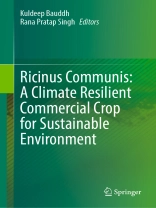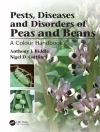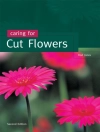Due to the diverse properties of Ricinus communis (castor), this book provides a comprehensive account of castor as a ‘climate resilient and value-added crop.’ It explores the morphological variations, various cultivation techniques, genotypic differences, suitable soil types, and the crop’s yield. The book also discusses the phytoremediation efficiency of castor, focusing on its role in restoring degraded lands, abandoned mining sites, and lands contaminated by heavy metals.
The application of suitable plants for the restoration of degraded lands is an efficient method due to its ecological and economic viability. Castor is a hardy angiosperm with multiple benefits. It serves the dual purpose of being an excellent phytoremediator and a source of bioenergy. Additionally, castor has proven effective in treating several human diseases. The castor plant’s ability to thrive in stressed soils makes it particularly suitable for the phytoremediation of polluted lands in various climatic conditions. Given its wide range of industrial uses, castor has gained significant attention for further exploration of its biology, cultivation techniques, and genotypic variations.
This book is of interest to teachers, researchers, botanists, capacity builders, and policymakers. It also serves as good reading material for undergraduate and master students of botany, ecology, and environmental sciences. National and international agricultural scientists, ecologists, and policymakers will also find it a valuable resource
Table of Content
.- Chapter 1:Plant and environment interaction: special reference to phytoremediation of heavy metals using Ricinus communis L.- Chapter 2: Botany, geographical distribution, cultivation techniques and crop productivity of Ricinus Communis L.- Chapter 3: Genetic variability and breeding opportunities in castor bean (Ricinus communis L).- Chapter 4: Nipping an innovative method to increase the yield of castor .- Chapter 5: Medicinal properties of Ricinus communis L. oil and their applications: An overview.- Chapter 6: Optimizing biodiesel production from non-edible castor oil through the development of a bi-functional catalyst: a case study.- Chapter 7: Castor plant in Ericulture: opportunities and challenges.- Chapter 8: Ricinus communis: an abiotic stress-tolerant crop for reclamation of wasteland reclamation .- Chapter 9: Abandoned mine sites restoration using an industrially important crop, Ricinus communis L .- Chapter 10: Phytoremediation of heavy metals from the metal-polluted soil using Ricinus communis .- Chapter 11:Assessing the Suitability of Cement Industry Effluent for Irrigating Eight Different Genetic Varieties of Castor bean (Ricinus communis L.): A Case Study.
About the author
Dr. Kuldeep Bauddh is an Associate Professor at the Institute of Environment and Sustainable Development (IESD), Rajiv Gandhi South Campus, Banaras Hindu University, Uttar Pradesh, India. He earned his M.Sc. and Ph.D. in Environmental Science from B.B. Ambedkar University, Lucknow, India. Dr. Bauddh specializes in teaching core areas of environmental sciences, including Environmental Pollution and Management, Environmental Toxicology, and Environmental Impact Assessment. His research primarily focuses on phytoremediation and sustainable agriculture. Dr. Bauddh has edited nine books and published 65 research papers in national and international journals, along with 33 book chapters. He has been awarded three R&D projects sponsored by the University Grants Commission (UGC) and the Science and Engineering Research Board (SERB), Government of India.
Dr. Rana Pratap Singh, a Senior Professor (Retired) from Department of Environmental Science, Babasaheb Bhimrao Ambedkar University, Lucknow, India, currently serves as the Director (Honorary) of The Center for Sustainable Agriculture and Environment, an R & D initiative of PHSS Foundation for Science and Society, Lucknow, India. He is fellow of National Academy of Sciences, India and 4 other scientific organizations. Professor Singh earned his Ph.D. in Life Sciences, specializing in Nitrogen Metabolism in Plants, from Devi Ahilya University, Indore, in 1985. He has held visiting scientist positions at AIIMS, New Delhi, the University of Guelph, Ontario, Canada, and Yunnan Agriculture University, Kunming, China. Recipient of eight national and state awards for his research and academic contributions, Prof. Singh has co-edited 18 books and authored over 180 research publications, garnering more than 7, 600 citations (H-index: 44; i10-index: 109). He is the Editor-in-Chief of Physiology and Molecular Biology of Plants (PMBP, IF-3.4) and serves on the editorial boards of numerous scientific journals. Currently, his research focuses on Climate-Resilient Multifunctional Microbial Stimulants for sustainable agriculture, as well as designing integrated below-ground and above-ground agroecosystems to maximize ecological and economic benefits.












